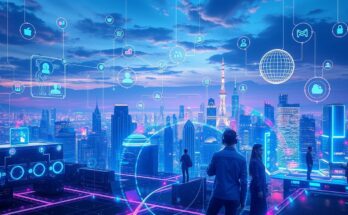AI Machines: Shaping Tomorrow’s World
Did you know AI has grown a lot in the last 20 years? It’s now changing many industries and making our lives better. AI is getting more common and is expected to change healthcare, finance, and creative fields even more12. This change is big and shows how we’re learning to work with machines in new ways.
The future of AI is exciting. It’s about making things more efficient, productive, and creative. As we use AI more, it’s important to know its history and the ethics of using it. Let’s dive into the latest AI advancements and how they’re changing different areas.

Key Takeaways
- AI has rapidly advanced since the 2000s, becoming a pivotal driver of innovation across multiple sectors.
- AI technologies are transforming healthcare, finance, transportation, and various other industries.
- Experts project significant untapped potential in AI that can reshape daily life and business practices.
- Emerging AI tools, such as OpenAI’s ChatGPT, are redefining how we approach tasks and communication.
- The impact of AI encompasses not just automation but also improvements in creativity and problem-solving.
A Brief History of Artificial Intelligence
The history of artificial intelligence is both fascinating and complex. It started with ancient myths but really began in the 1940s with the rise of electronic computers. This period saw many innovations that led to the creation of smart machines.
The Origins of AI Machines
The first digital computers were invented about 80 years ago. This marked the beginning of AI. Early research focused on basic systems that could solve logical problems. Pioneers laid the groundwork for machine learning and advanced algorithms.
Milestones in AI Development
The 1960s and 1970s were key for AI. Early programs showed cognitive functions. Since 2010, AI training has grown fast, enabling tasks like mammogram interpretation with 99% accuracy34.
AI has also improved language and image recognition, reaching human levels5. The 2000s brought powerful computing and large datasets. This led to narrow AI for specific tasks and hopes for general AI. The AI market is expected to grow from $150.2 billion in 2023 to $1,345.2 billion by 20303.
The Evolution of Artificial Intelligence
The journey of AI has changed the tech world a lot. It started with rule-based systems. These systems used set rules and expert knowledge for certain tasks but couldn’t adapt much. The 1960s saw the start of expert systems, which used rules to automate tasks6.
Early Research and Rule-Based Systems
Rule-based systems were the first step in AI. But, they were too rigid. They worked well in controlled situations but struggled with flexibility. Companies soon realized they needed systems that could learn and grow with new data.
Advancements in Machine Learning and Data Processing
Machine learning changed AI a lot. It started in the 1980s with backpropagation, helping machines learn from data6. Deep learning then became key, letting machines learn from data in layers. This improved how they processed information.
Today, AI and machine learning are key in many fields, like healthcare and finance. By 2023, 42% of big companies use AI, and 40% are thinking about it7. Generative AI is also getting more popular, with 38% of companies using it7.
AI’s role in big data analysis is growing. It helps companies offer better services and improve customer experiences. These changes make businesses more efficient and give them an edge in the market. The ongoing innovation in AI shows its importance for businesses.
| Era | Key Development | Impact on AI |
|---|---|---|
| 1960s | Expert Systems | Automated tasks using predefined rules |
| 1980s | Machine Learning Introduction | Enabled computers to learn from data |
| Recent Years | Deep Learning Popularity | Improved data processing through feature hierarchies |
Exploring AI technology gives us insights into its potential and challenges. Keeping up with updates is crucial for companies wanting to use AI wisely, facing both chances and risks.
“AI and ML enable more efficient automation of business processes, saving time and resources.” 6
Applications of AI Across Industries
AI is changing many sectors, making things more efficient and productive. It’s used in healthcare, finance, and transportation, helping companies improve their services. This shows how AI is making a big difference in these fields.
AI in Healthcare
In healthcare, AI helps with tasks like paperwork and diagnosing diseases. It can look at medical images to find diseases early. It even helps with surgeries, making them more precise and safe.
AI could make healthcare cheaper and better for patients. It’s also speeding up finding new medicines. This is a big change in how we get medical care8.
AI in Finance
In finance, AI is used for talking to customers, finding fraud, and checking risks. AI chatbots help banks and banks talk to customers better9. It also helps with trading, making decisions faster and smarter.
Using AI can make finance work 30% better for companies that use it8.
AI in Transportation
Transportation is changing with AI, like self-driving cars and better traffic systems. AI could cut car accidents by over 90% a year8. It also makes deliveries faster and more efficient, which is key for global trade9.
AI is becoming more important in transportation, helping make it better and safer.
The Future of AI Machines
The world of AI is set for a big change. We’re looking at more advanced AI in the future. This will make life easier and change how we use machines.
Predictions for AI Technologies
AI is moving from weak to strong AI. Soon, AI will be better at thinking than humans in many areas. We’ll see AI in healthcare, finance, and education, making things more efficient.
AI will also change how we do things in the military and advertising. This is all thanks to advancements in AI types like Narrow, General, and Super AI1011.
AI in Everyday Life
AI will soon be part of our daily lives. By 2025, most cars will use AI. This will make traveling easier and more efficient.
Young people are already using AI for their money. This shows AI will help us make choices in the future10. AI will make our lives smarter, with tasks done easier and information at our fingertips.

| Aspects | Impact of AI Technologies | Everyday Applications |
|---|---|---|
| Technology Evolution | Stronger AI capabilities | AI in vehicles |
| Industry Disruption | Healthcare, finance transformation | Robo-advisors for investments |
| Cognitive Tasks | Surpassing human abilities | AI-assisted daily management |
The Impact of AI on the Job Market
AI is changing the job market in big ways. It’s taking over tasks that humans used to do, like in finance, media, and customer service. A 2013 study by the University of Oxford found that nearly 47% of US jobs could be automated by AI in 20 years12. More recently, Goldman Sachs estimated that generative AI could affect around 300 million jobs worldwide12.
The Rise of Automation
AI is making automation more common in many fields. A 2020 report by the World Economic Forum said jobs in legal services, driving, and factories are at high risk of being automated12. Companies are now investing more in AI, with 52% speeding up their plans because of global events13. Also, 86% of companies see AI as key to their success, leading to changes in what jobs are needed13.
New Job Opportunities and Skill Requirements
Even though some jobs might disappear, new ones are being created in the AI world. Jobs like AI prompt engineers, ethics specialists, and audit managers are becoming important12. There’s a growing need for skills in robotics, big data, and IT, showing a move towards STEM fields13. To keep up, people need to learn skills like analytical thinking, problem-solving, and technology use, as the World Economic Forum suggests12.
Programs like the Master of Science in Applied Artificial Intelligence at the University of San Diego help students get ready for the changing job market12. Networking is key to finding new job chances in a world where automation is big. Workers with lower skills can see their performance go up by 43% with AI tools, showing how tech can make us more productive13.
Ethical Considerations in AI Development
As AI technologies grow, ethics become more important. We need to make sure AI is used right and with care. This means being open about how AI works and fixing any bias in its algorithms.
Transparency and Accountability in AI Systems
Being open about AI is key to gaining trust. Knowing how AI algorithms work helps spot any biases. The White House has put $140 million into studying AI ethics14.
U.S. agencies are working hard to make AI fair. They want to stop AI from being biased and to prevent unfair treatment14. But, there are big privacy worries, especially with AI used for watching people in China14.
Ensuring Fairness and Bias-Free Algorithms
AI developers must focus on fairness. They should use diverse data to train AI. There are big worries about AI weapons needing rules14.
AI in finance is also risky. It could make old unfair decisions again without checking15. We need to act fast to fix these problems, like training workers for new jobs14.

| Aspect | Data Point |
|---|---|
| Investment in Ethical AI Challenges | $140 million |
| Business Spending on AI (2023) | $50 billion |
| Projected Annual AI Spending by 2024 | $110 billion |
| AI in Medicine Cost Savings | $1 billion for new pharmaceutical development |
| Small Businesses Employing Workforce | 50% |
Challenges and Limitations of AI
Artificial Intelligence is facing big challenges, even with its fast progress. The technical limitations in AI need constant work to improve algorithms and computing power. Experts say getting AI right is key, especially in areas like healthcare and finance, where mistakes can be very harmful.
Studies show we need strong systems to make AI work well in healthcare16.
Technical Challenges in AI Development
Creating advanced algorithms that understand complex situations is a big AI challenge. In healthcare, AI is being used more, like in clinical trials and imaging. But, making these work well needs good plans16.
By 2030, AI bots will likely change how we interact. But, we must think about how this affects our rights, privacy, and economy17.
Social and Ethical Challenges
AI could make some people wealthier and more powerful, raising ethical issues in AI. While 63% of experts hope AI will help society by 2030, 37% worry about more inequality and surveillance17.
AI’s impact on fairness and society is a big concern. We need to make sure AI helps people, not just technology.
Advancements in AI Research and Development
AI research has made huge strides in many areas, opening up new chances and challenges. Deep learning has been a game-changer, letting machines dig through huge data sets with complex neural networks. This tech boost has made AI better at many tasks.
Innovations in Deep Learning
Deep learning has grown a lot in the last ten years. Big steps forward in image and speech recognition are thanks to these advances. For example, GANs have made it possible to create fake content that looks real, like images and videos18.
Also, models like GPT and BERT have greatly improved how AI understands and generates text. They can handle billions of parameters to write text that’s almost as good as a human18.
Technological Advancements Shaping AI
AI has had a big impact on industries and society. In 2017, only 17 percent of top business leaders knew about AI, showing a big knowledge gap19. AI is expected to add $15.7 trillion to the global GDP by 2030, showing its huge economic value19.
AI has also changed finance, from catching fraud to fast trading, making big changes in how businesses work19. Robotics has gotten smarter, making machines that can move quickly and work in many ways18.
| Category | Progress Highlights |
|---|---|
| Image Processing | Real-time object detection and advancements in face recognition technology |
| Speech Recognition | Rise of voice-controlled assistants like Google Assistant and Siri |
| Automation | Increased use in manufacturing, driving efficiency in production |
| Gaming | AI algorithms outperforming human players in games like Go and Chess |
| Healthcare | AI’s role in medical diagnostics is growing, enabling better patient outcomes |
The Role of AI in Solving Global Challenges
Artificial Intelligence is key in tackling big global problems. It uses advanced tech to help find solutions for issues like climate change and healthcare.
AI’s Potential in Climate Change Mitigation
AI has made weather forecasts much more accurate, helping us prepare and respond better, says the World Economic Forum20. For example, Google’s AI system predicted floods in India, helping save lives20. AI also looks at environmental data to spot trends and improve predictions, helping fight climate change21.
Healthcare Innovations with AI
In healthcare, AI has changed how we diagnose and treat patients. It helps doctors improve care and cut costs20. IBM Watson Health gives doctors insights to make better treatment plans, enhancing care20. AI also digs through big data to find patterns, leading to better disease management and resource use in healthcare21.
COMPLEMENTARY ARTICLE :https://aibasic.io/ai-for-marketing-boost-your-strategy-today/
Conclusion
The future of artificial intelligence looks bright, with big changes coming to many areas. AI is already changing healthcare and finance, making a big impact. But, we must watch out for the ethical side and the risks of AI making too many decisions on its own22.
AI is also making industries like robotics and manufacturing work better. But, it raises questions about jobs and fairness23. Teaching kids about AI in school is key to getting them ready for this new world22. We need to make sure AI works for everyone, keeping human values and rights safe.
As we move forward with AI, working together is essential. Governments, businesses, and researchers need to team up. This way, we can use AI’s power to improve our lives, not just make things worse24.
FAQ
What is artificial intelligence (AI)?
Artificial Intelligence (AI) is about making computers do things that humans do. This includes things like understanding language, learning, and solving problems.
How has AI evolved over the years?
AI started in the 1950s. It grew a lot in the 1960s and 1970s. Now, we have machine learning and deep learning. These help computers learn from data and get better at complex tasks.
What are some applications of AI across various sectors?
AI is used in many ways. In healthcare, it helps doctors make better diagnoses. In finance, it predicts market trends and finds unusual patterns. In transportation, it helps with self-driving cars and managing traffic.
What does the future of AI machines hold?
The future of AI looks bright. We expect to see more advanced uses in creative fields. AI will also become a bigger part of our daily lives. It will help us make smarter decisions with the help of predictive analytics.
How will AI impact the job market?
AI might change the job market a lot. It could make some jobs disappear because of automation. But, it will also create new jobs. These new jobs will involve working with AI systems, analyzing data, and managing AI projects.
What ethical considerations are associated with AI development?
There are important ethics in AI. We need to make sure AI is transparent and fair. We must avoid biases in AI systems. This is to keep users’ trust and prevent unfair treatment.
What challenges does AI currently face?
AI has many challenges. There are technical hurdles to make AI better. There are also social issues like job loss, economic inequality, and privacy concerns.
What advancements are being made in AI research?
AI research is moving fast. We’re seeing new things in deep learning, image and speech recognition, and natural language processing. We’re also improving how AI systems work.
How can AI help solve global challenges?
AI can help with big global problems. It can predict climate change and help us find solutions. It can also make healthcare better by helping doctors diagnose and treat patients more efficiently.
Source Links
- The Future Of Technology: Exploring The Role Of AI In Tomorrow’s World – https://www.iamdave.ai/blog/the-future-of-technology-exploring-the-role-of-ai-in-tomorrows-world/
- “Artificial Intelligence: Shaping Tomorrow’s World” – https://medium.com/naushizz/artificial-intelligence-shaping-tomorrows-world-71272d39e4ae
- The Evolution and Future of Artificial Intelligence | CMU – https://www.calmu.edu/news/future-of-artificial-intelligence
- The brief history of artificial intelligence: the world has changed fast — what might be next? – https://ourworldindata.org/brief-history-of-ai
- The Brief History of Artificial Intelligence: The World Has Changed Fast—What Might Be Next? – https://singularityhub.com/2022/12/29/the-brief-history-of-artificial-intelligence-the-world-has-changed-fast-what-might-be-next/
- The Evolution of Artificial Intelligence and Machine Learning – Qymatix Predictive Sales Software – https://qymatix.de/en/the-evolution-of-artificial-intelligence-and-machine-learning/
- The Future of AI: How AI Is Changing the World | Built In – https://builtin.com/artificial-intelligence/artificial-intelligence-future
- 15 Applications of Artificial Intelligence | CMU – https://www.calmu.edu/news/applications-of-artificial-intelligence
- Applications of Artificial Intelligence Across Various Industries – https://www.forbes.com/sites/qai/2023/01/06/applications-of-artificial-intelligence/
- Future of AI (Artificial Intelligence): What Lies Ahead? – https://www.simplilearn.com/future-of-artificial-intelligence-article
- The Future of AI is Now – https://today.ucsd.edu/story/the-future-of-ai-is-now
- 4 Ways AI Impacts the Job Market & Employment Trends – https://onlinedegrees.sandiego.edu/ai-impact-on-job-market/
- How Is Artificial Intelligence Impacting the Job Market? – https://www.linqto.com/blog/how-is-artificial-intelligence-impacting-the-job-market/
- The Ethical Considerations of Artificial Intelligence | Capitol Technology University – https://www.captechu.edu/blog/ethical-considerations-of-artificial-intelligence
- Ethical concerns mount as AI takes bigger decision-making role – https://news.harvard.edu/gazette/story/2020/10/ethical-concerns-mount-as-ai-takes-bigger-decision-making-role/
- Drawbacks of Artificial Intelligence and Their Potential Solutions in the Healthcare Sector – https://www.ncbi.nlm.nih.gov/pmc/articles/PMC9908503/
- Artificial Intelligence and the Future of Humans – https://www.pewresearch.org/internet/2018/12/10/artificial-intelligence-and-the-future-of-humans/
- SQ2. What are the most important advances in AI? – https://ai100.stanford.edu/gathering-strength-gathering-storms-one-hundred-year-study-artificial-intelligence-ai100-2021-1/sq2
- How artificial intelligence is transforming the world – https://www.brookings.edu/articles/how-artificial-intelligence-is-transforming-the-world/
- The Role of AI in Solving Global Challenges – https://medium.com/pythons-gurus/the-role-of-ai-in-solving-global-challenges-4aebcc8bda76
- Tackling global challenges with artificial intelligence – https://www.aiacceleratorinstitute.com/tackling-global-challenges-with-ai/
- Conclusions – https://ai100.stanford.edu/gathering-strength-gathering-storms-one-hundred-year-study-artificial-intelligence-ai100-2021-3
- What is the Future of AI in Robotics? – https://www.azorobotics.com/Article.aspx?ArticleID=700
- AI: the future of humanity – Discover Artificial Intelligence – https://link.springer.com/article/10.1007/s44163-024-00118-3




Thank you for writing this post!
May I have information on the topic of your article?